

Income inequality is an increasingly contentious political issue in the United States. The top 1% of earners in the United States control nearly double the amount of wealth as the lowest earning 50%. This is not a uniquely American problem however — and income inequality in the United States appears to be a microcosm of uneven wealth distribution on a global scale.
North America is home to fewer than 5% of the global population — yet the continent’s combined gross domestic product accounts for over one-quarter of global economic activity. Meanwhile, sub-Saharan Africa is home to nearly 14% of the world’s population, yet the region’s economic output accounts for only 2% of global GDP.
While GDP is a practical way to measure the size of a given country or region’s economy, it does not accurately reflect the overall wealth of a population. Unlike GDP, gross national income, or GNI, accounts for all economic activity within a country’s borders in addition to wealth generated by nationally-owned entities operating abroad. Adjusted to the population and converted to U.S. dollars, GNI per capita is a good approximation of the average income of residents of a given country.
24/7 Wall St. reviewed GNI per capita in over 170 nations to identify the 25 poorest countries in the world. Worldwide, the average person lives on about $10,300 per year. In the poorest countries, approximate annual incomes per person range from only $900 on the high end, to less than $300 in the poorest country.
Click here to see the 25 poorest countries in the world.
Click here to see our detailed findings and methodology.

25. Tanzania
> GNI per capita: $900
> 2016 GDP: $47.4 billion
> Population: 55.6 million
> Life expectancy: 64.9 years at birth
What sets Tanzania apart from many other African countries is domestic and political stability. Unfortunately, this has not translated into economic prosperity for its citizens. The country’s GNI per capita is $900, despite a low unemployment rate of 2.7%. Tanzania’s economy depends heavily on agriculture, which contributed 31.1% to the country’s GDP in 2016.The country’s agricultural production is largely for internal consumption, and Tanzania’s top export is gold.
However, like many of the poorest countries, Tanzania’s economic growth of 7% in 2016 was faster than the 2.4% average growth worldwide.
[in-text-ad]

24. Benin
> GNI per capita: $820
> 2016 GDP: $8.6 billion
> Population: 10.9 million
> Life expectancy: 60.6 years at birth
Slave ships used to depart from the shores of this western African country, which today has one of the worst economic environments in the world. Due in large part to bribable public officials, Transparency International considers Benin to be one of the most corrupt countries in the world. Like many of the poorest countries in the world, Benin’s economy depends heavily on its resources. For example, cotton, coconuts, Brazil nuts, and cashews account for over half of the country’s total exports.
While Benin has one of the lowest unemployment rates in the world, at 1%, it also has one of the highest illiteracy rates. Less than 33% of Benin residents 15 and older were considered literate in 2012.

23. Haiti
> GNI per capita: $780
> 2016 GDP: $8.0 billion
> Population: 10.8 million
> Life expectancy: 63.0 years at birth
Haiti is the poorest nation in the Caribbean and one of the poorest countries in the world. The typical Haitian lives on less than $800 a year.
Economic strife in Haiti is largely a product of the country’s history. After overthrowing France, its colonial ruler in in the early 19th century, Haiti was forced to pay its former sovereign an “independence debt” for nearly a century and a half. In the country’s more recent history, economic prosperity has been stymied by authoritarian leaders, instability, and natural disasters — including the 7.0 magnitude earthquake that devastated the island nation in 2010. A largely labor based economy, the knitting industry comprises nearly 70% of Haiti’s total exports.

22. Comoros
> GNI per capita: $760
> 2016 GDP: $616.7 million
> Population: 0.8 million
> Life expectancy: 63.5 years at birth
With a GDP of only $616.7 million, Comoros’ economy is one of the smallest in the world. Adjusted for the country’s 800,000 residents, people in Comoros live on less than $800 a year, on average. Like many poor nations, economic prosperity in Comoros is hindered by bribable public officials, unreliable institutions, and misappropriated public funds. According to Transparency International, Comoros is one of the most corrupt countries in the world. Rampant corruption and political instability partially explain why the country has endured more than a dozen coups or attempted coups.
Today, Comoros’ unemployment rate is one of the world’s highest, at 20%. Heavily resource dependent, Comoros’ economy is often at the mercy of volatile commodity prices. In 2015, cloves accounted for well over half of the island country’s exports.
[in-text-ad-2]

21. Mali
> GNI per capita: $750
> 2016 GDP: $14.0 billion
> Population: 18.0 million
> Life expectancy: 57.5 years at birth
Due to a 23-year military dictatorship, droughts, and rebellion, Mali has been unable to regain its northern city Timbuktu’s former status as a key cultural and trade region of Africa. The country has been plagued by a recent rise in Islamic insurgency, which caused France to intervene militarily in 2013 and later for the UN to sponsor a ceasefire. Despite recent conflict, Mali’s economy is growing relatively rapidly. The landlocked African nation’s GDP expanded by 5.3% in 2016, far faster than the comparable 2.4% global economic growth.
Many of the world’s poorest countries are resource rich and heavily dependent on agriculture — and Mali is no different. Gold accounted for 72% of the country’s total exports in 2016. Additionally, farming accounts for 40.7% of the country’s total economic output.

20. Nepal
> GNI per capita: $730
> 2016 GDP: $21.1 billion
> Population: 29.0 million
> Life expectancy: 69.9 years at birth
A landlocked country in between India and China, Nepal has been recovering from a decade-long Maoist insurgency that ended in 2006. This led the country to transition from a monarchy to a democracy at the cost of 17,000 lives during the 10 years of fighting.
Though the country’s new found stability has helped the economy, Nepal still faces challenges. The country’s GDP grew by only 0.6% in 2016, well below global economic growth of 2.4%. Heavily dependent on farming, agriculture accounts for 33.0% of the country’s GDP. Today, the average Nepalese citizen lives off of about $730 a year.
[in-text-ad]

19. Chad
> GNI per capita: $720
> 2016 GDP: $9.6 billion
> Population: 14.5 million
> Life expectancy: 52.6 years at birth
Due to a range of economic and political factors, the citizens of countries rich with oil, minerals, and other resources are often among the poorest people in the world. Chad is no exception. The country’s economy is heavily dependent on its gold, uranium, and oil deposits and is anything but diversified. About half of the country’s economic output comes from agriculture, and crude oil represents 93% of its exports.
Like many of the world’s poorest countries, many in Chad suffer from poor health. Life expectancy at birth in the landlocked African nation is only 52.6 years.

18. Rwanda
> GNI per capita: $700
> 2016 GDP: $8.4 billion
> Population: 11.9 million
> Life expectancy: 66.6 years at birth
In the mid-1990s, the landlocked country of eastern-central Africa experienced one of the worst humanitarian crises in recent history when an estimated 800,000 people had been killed in 100 days of state-funded genocide. Since then, the government has made a turnaround, with 16.6% of government spending going into education. Additionally, Rwanda’s government and institutions are the least corrupt of the countries on this list, according to Transparency International. Some 31.5% of Rwanda’s 2016 GDP comes from agriculture, which helped boost GDP by nearly 6% in 2016. Refined petroleum and tea are the country’s top exports, representing 17% and 12% of total exports, respectively.
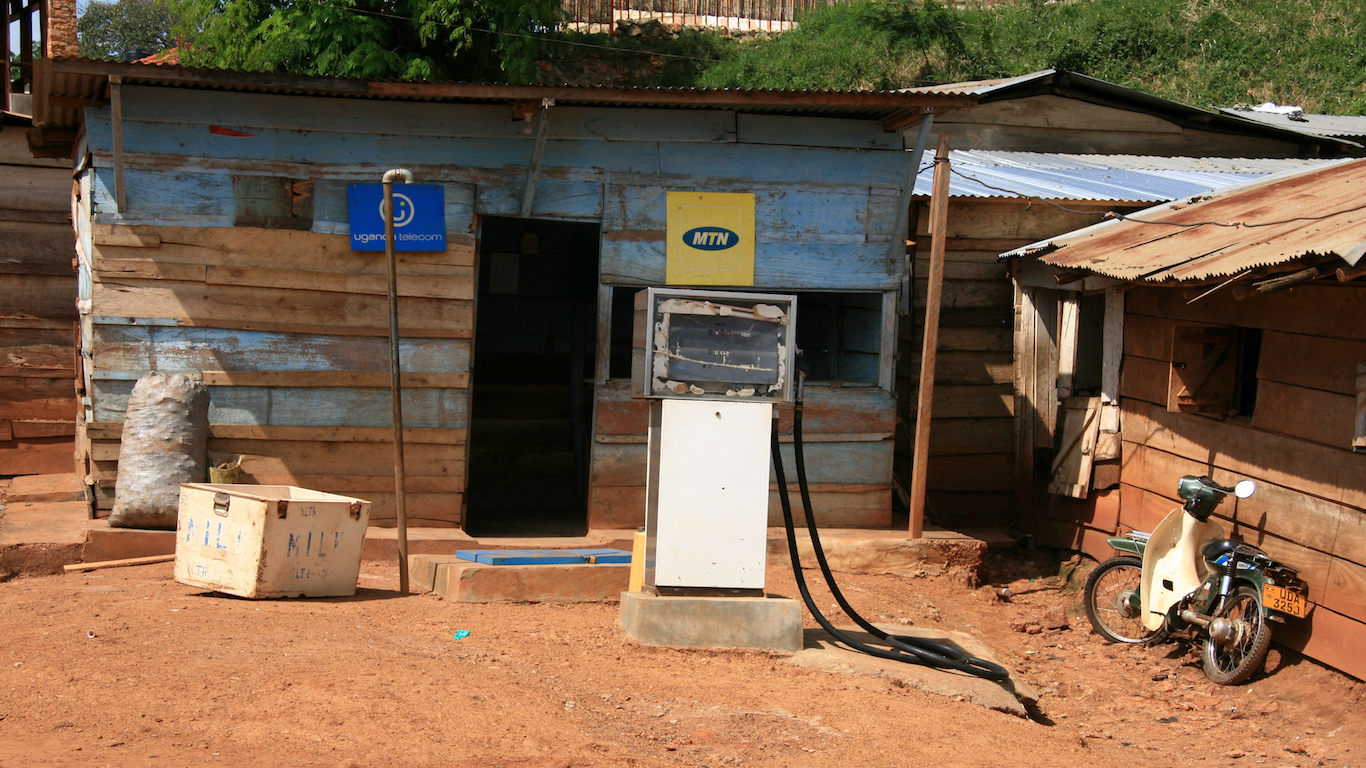
17. Uganda
> GNI per capita: $660
> 2016 GDP: $25.5 billion
> Population: 41.5 million
> Life expectancy: 59.5 years at birth
Though conditions have improved dramatically since Idi Amin was forced from power in 1979, according to Transparency International, Uganda is one of the most corrupt countries in the world. Bribable public officials, untrustworthy institutions, and misappropriated public funds all hinder economic development in the landlocked African nation.
Despite widespread corruption, GDP growth is relatively rapid in Uganda. The country’s 4.6% economic growth in 2016 was faster than the 2.4% global economic growth the same year. Still, the average annual income of a Ugandan is only $660, nearly $10,000 less than the global average.
[in-text-ad-2]
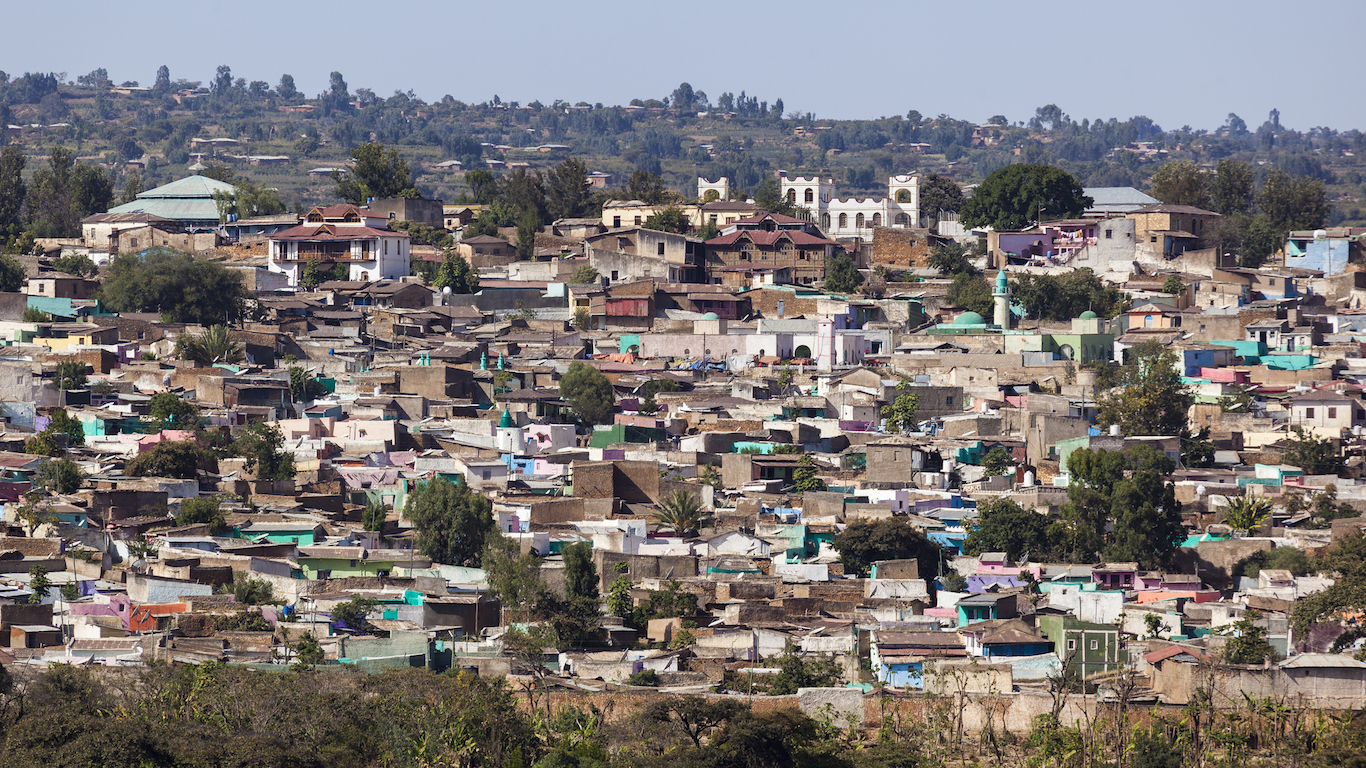
16. Ethiopia
> GNI per capita: $660
> 2016 GDP: $72.4 billion
> Population: 102.4 million
> Life expectancy: 65.0 years at birth
Like many of the world’s poorest countries, Ethiopia’s economy is heavily dependent on agriculture. Over a third of the east African nation’s $72.4 billion GDP is generated through farming. An over reliance on agriculture is especially problematic in Ethiopia as the country frequently faces droughts that result in famine.
Despite low incomes, Ethiopia is one of the fastest growing economies. The country’s GDP expanded by 7.6% in 2016, more than triple the global economic growth rate.

15. Burkina Faso
> GNI per capita: $640
> 2016 GDP: $12.1 billion
> Population: 18.6 million
> Life expectancy: 59.8 years at birth
Burkina Faso, which means “the land of honest men,” has one the least corrupt governments among the poorest countries in the world, according to Transparency International. Recurring droughts and military coups have hindered development in the landlocked West African country, which relies on agriculture for 32.6% of its GDP. Despite recent economic hardship, Burkina Faso experienced a growth of nearly 6% of its annual GDP in 2016 — more than double global economic growth. Accounting for 73% of Burkina Faso’s exports, Gold dominates the country’s $3.5 billion export industry.
[in-text-ad]

14. Guinea-Bissau
> GNI per capita: $620
> 2016 GDP: $1.1 billion
> Population: 1.8 million
> Life expectancy: 57.0 years at birth
Guinea-Bissau has several high hurdles to clear before it can achieve lasting economic prosperity. For example, less than half of the country’s 15 and older population could read as of 2014. Additionally, life expectancy in Guinea-Bissau is only 57 years at birth — well below the global average of nearly 72 years.
Like many of the world’s poorest countries, Guinea-Bissau’s economy is heavily dependent on agriculture and natural resources. Coconuts, Brazil nuts, and cashews accounted for 84% of the the country’s exports in 2015. Additionally, agriculture accounted for 43.7% of the country’s economic output in 2013.
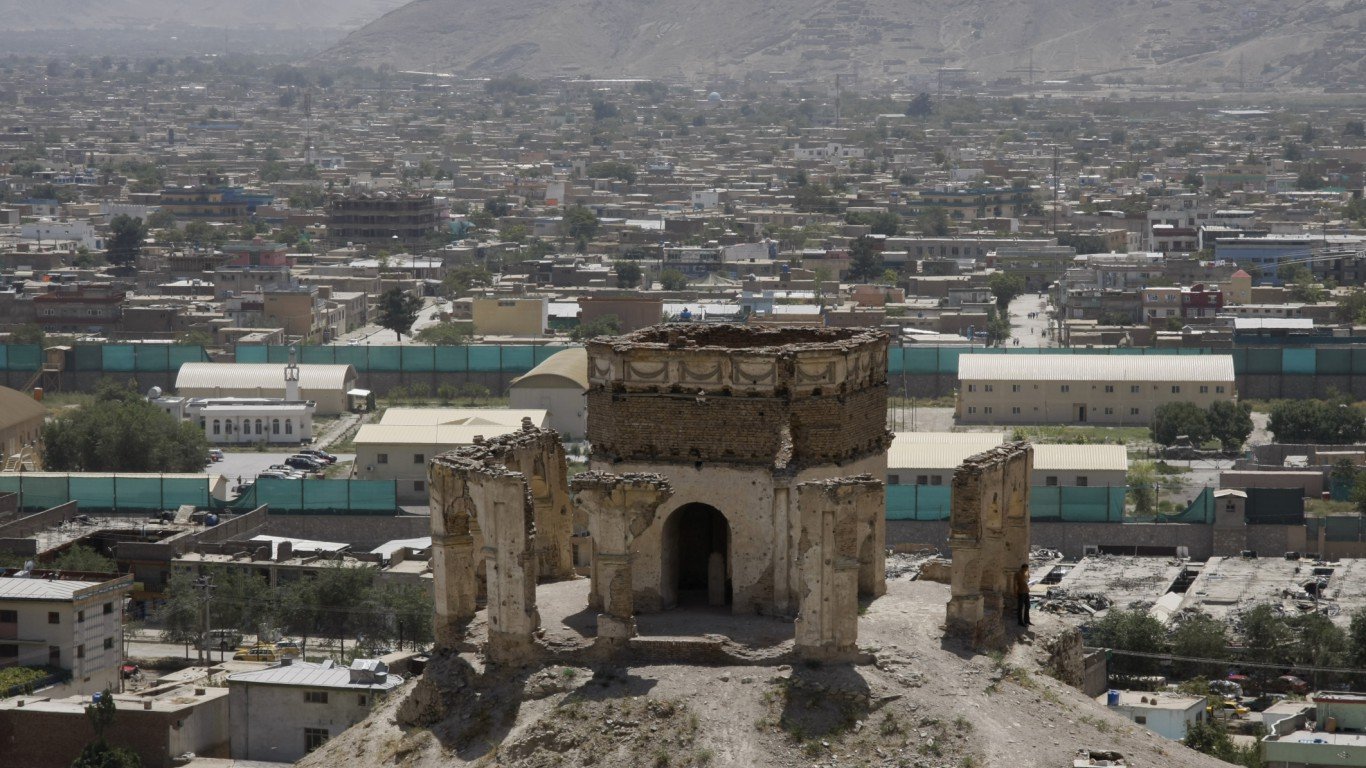
13. Afghanistan
> GNI per capita: $580
> 2016 GDP: $19.5 billion
> Population: 34.7 million
> Life expectancy: 63.3 years at birth
Like many of the world’s poorest countries, Afghanistan has been mired in conflict on and off for decades. Today, the country is grappling with increasing Taliban activity and ranks among the most corrupt countries in the world, according to Transparency International.
Joblessness is a considerable problem in Afghanistan. Some 8.6% of the country’s labor force are out of a job compared to a 5.8% global unemployment rate. Economically dependent on agriculture, grapes and vegetable saps represent the top commodity for export in the country, making up 20% and 18% of total exports, respectively. Agriculture as a whole accounts for 21.9% of economic activity in the country.

12. Togo
> GNI per capita: $540
> 2016 GDP: $4.4 billion
> Population: 7.6 million
> Life expectancy: 59.9 years at birth
With a GNI of only $540 per capita, Togo is heavily dependent on foreign aid. As is often the case in poor nations, agriculture is the primary economic engine in Togo. About 41% of Togo’s GDP is generated through farming.
Inadequate education systems present a major obstacle to economic development in Togo, as only 63.7% of the country’s 15 and over population are literate. Togo is among a minority of countries in which average life expectancy at birth is less than 60 years.
[in-text-ad-2]

11. Sierra Leone
> GNI per capita: $490
> 2016 GDP: $3.7 billion
> Population: 7.4 million
> Life expectancy: 51.4 years at birth
Economic growth in Sierra Leone has been stymied by a devastating civil war that ended only 15 years ago. The West African nation is one of only 11 countries in which the average citizen lives on less than $500 per year. People who are struggling financially are more likely to be unhealthy, and life expectancy in Sierra Leone is nearly the lowest in the world, at only about 51 years at birth.
Today, corruption, a poorly educated workforce, and access to financing are all major impediments for the country’s economic development, according to the World Economic Forum. The country ranks among the most corrupt in the world by Transparency International, and fewer than a third of residents 15 and older are literate.

10. Guinea
> GNI per capita: $490
> 2016 GDP: $6.3 billion
> Population: 12.4 million
> Life expectancy: 59.4 years at birth
For a variety of economic and political reasons, resource-rich countries often rank among the poorest in the world. Guinea is one such country. Aluminum ore comprised 30% of the country’s $2.5 billion in exports in 2015, and gold accounted for 38%. Overly dependent on its resources, agriculture accounts for over one-fifth of the country’s GDP. Stronger educational systems would likely help spur economic growth as less than a third of Guineas age 15 and older are literate.
As the country struggles to adequately care for its own citizens, its economy is being strained by hundreds of thousands of refugees coming from neighboring Sierra Leone and Liberia.
[in-text-ad]

9. Mozambique
> GNI per capita: $480
> 2016 GDP: $11.0 billion
> Population: 28.8 million
> Life expectancy: 57.6 years at birth
Mozambique has faced a variety of issues since gaining its independence from Portugal in 1975. Political tension, the effects of a 16-year civil war, and corruption weigh on the country’s economy. According to the World Economic Forum’s 2017 Global Competitiveness Report, corruption is the second most problematic factor for doing business in Mozambique, behind access to financing. As a result of the country’ economic struggles, over 24% of its workforce is unemployed.
The country’s economic future may be looking up as Mozambique discovered gas fields off its coastline in 2011. Today, energy sources, including petroleum, account for nearly a third of the country’s $6.1 billion in annual exports.
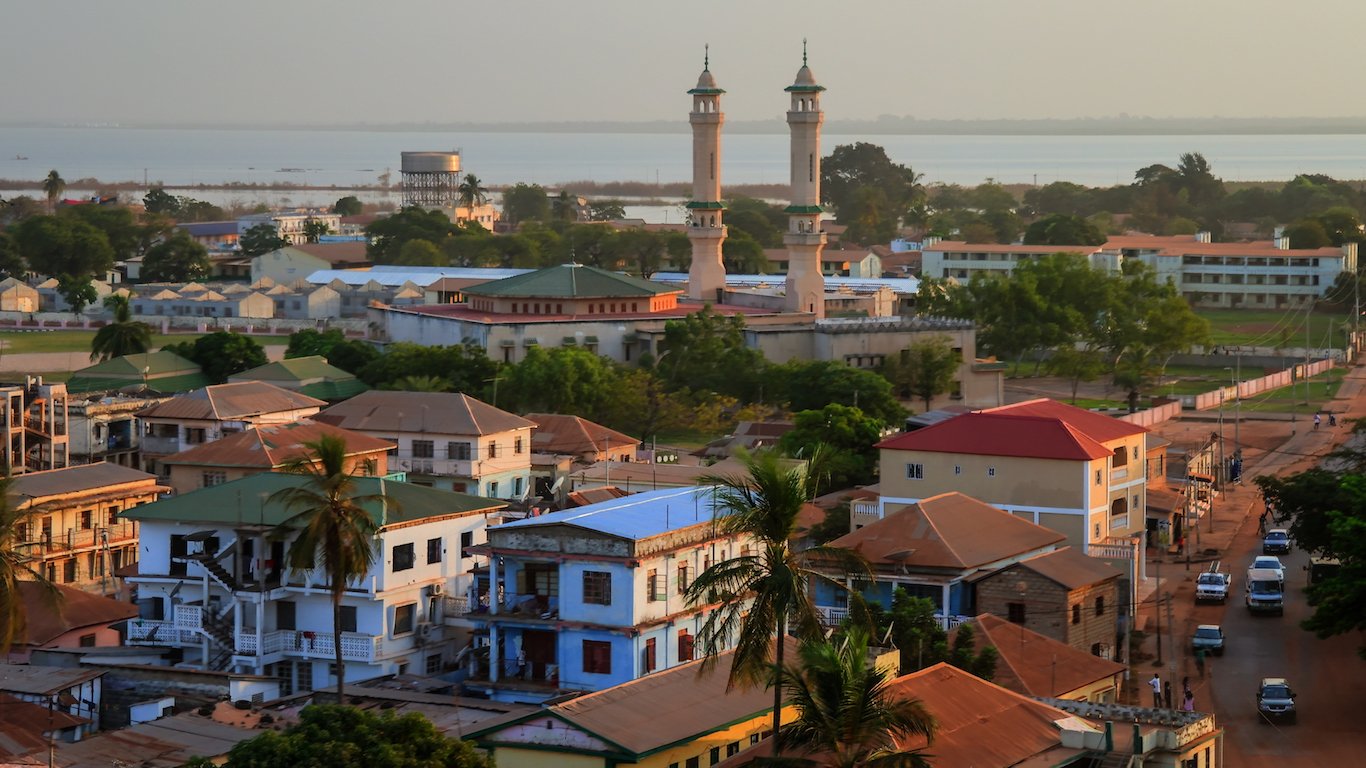
8. The Gambia
> GNI per capita: $440
> 2016 GDP: $1.0 billion
> Population: 2.0 million
> Life expectancy: 61.0 years at birth
Emerging from 22 years of authoritarian rule under president Yahya Jammeh in 2016, The Gambia is grappling with widespread economic strife. Despite newly found political freedom, many of the country’s residents are among the poorest people in the world. The average resident lives on only about $440 a year.
Economic prosperity is hindered considerably by corruption, and at nearly 30%, unemployment is higher in The Gambia than in every other country on this list. Heavily dependent on agriculture and natural resources, The Gambia’s export market is dominated by two industries: the sale of rough wood at 43% of total exports and nuts at 34%.

7. Democratic Republic of Congo
> GNI per capita: $420
> 2016 GDP: $35.0 billion
> Population: 78.7 million
> Life expectancy: 59.2 years at birth
Home to nearly 79 million people, the Democratic Republic of Congo is among the most populous countries in sub-Saharan Africa. Its $35 billion economy is also nearly the largest among countries on this list. However, adjusting for the population, the DRC is nearly the poorest country in the world.
Like many of the world’s poorest countries, DRC is resource rich and heavily dependent on farming. The country’s rich soil and abundant deposits of uranium, cobalt, gold, and diamonds have lead to civil wars that have claimed millions of lives. Agriculture accounts for over 20% of the country’s total economic output.
[in-text-ad-2]

6. Madagascar
> GNI per capita: $400
> 2016 GDP: $10.0 billion
> Population: 24.9 million
> Life expectancy: 65.5 years at birth
Known for its distinct wildlife not found anywhere else in the world, Madagascar is a tourist hub that is also one of the poorest countries in the world. The country is gradually shifting from its agricultural economy, with farming contribution to economic output dropping from 28.4% to 24.4% of total GDP in the last five years. Madagascar has a relatively low unemployment rate of 2.3% compared to the global average of 5.8%. The country’s two primary exports are vanilla and raw nickel, accounting for 19% and 18% of total exports, respectively.
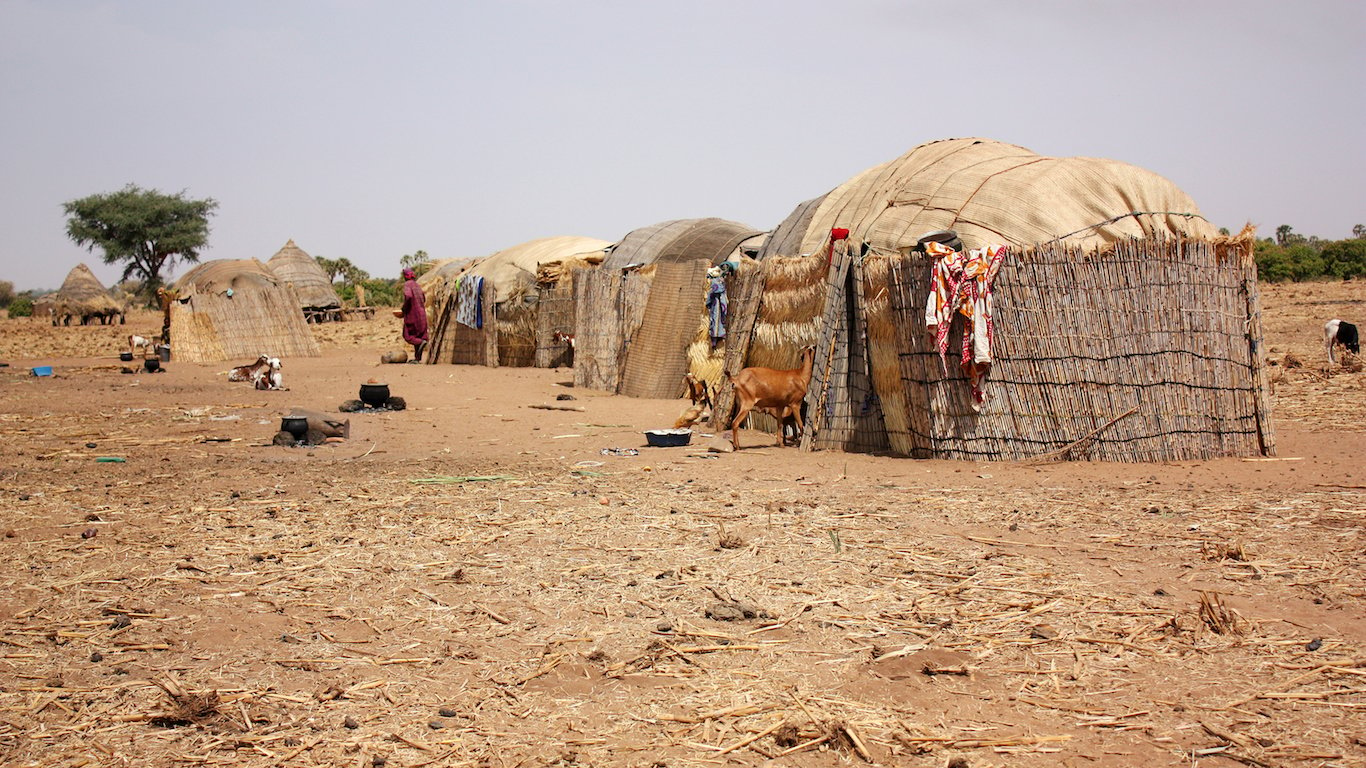
5. Niger
> GNI per capita: $370
> 2016 GDP: $7.5 billion
> Population: 20.7 million
> Life expectancy: 59.7 years at birth
Rated by the UN as one of the least developed countries in the world, Niger struggles with droughts, political instability and insurgency. In fact, basic human rights are still a major issue in the country, with slavery only being banned in 2003. A strong education system could push a country in the right direction, and Niger invests heavily in its schooling. But while the government allocates more of its spending to education that is typical in most countries, only 15.5% of people in Niger 15 and older were considered literate in 2012 — the lowest literacy rate of all the poorest countries. Recently discovered oil fields are taking the forefront of Niger’s economy, with the oil and mining industry accounting for nearly half of the country’s total exports.
[in-text-ad]
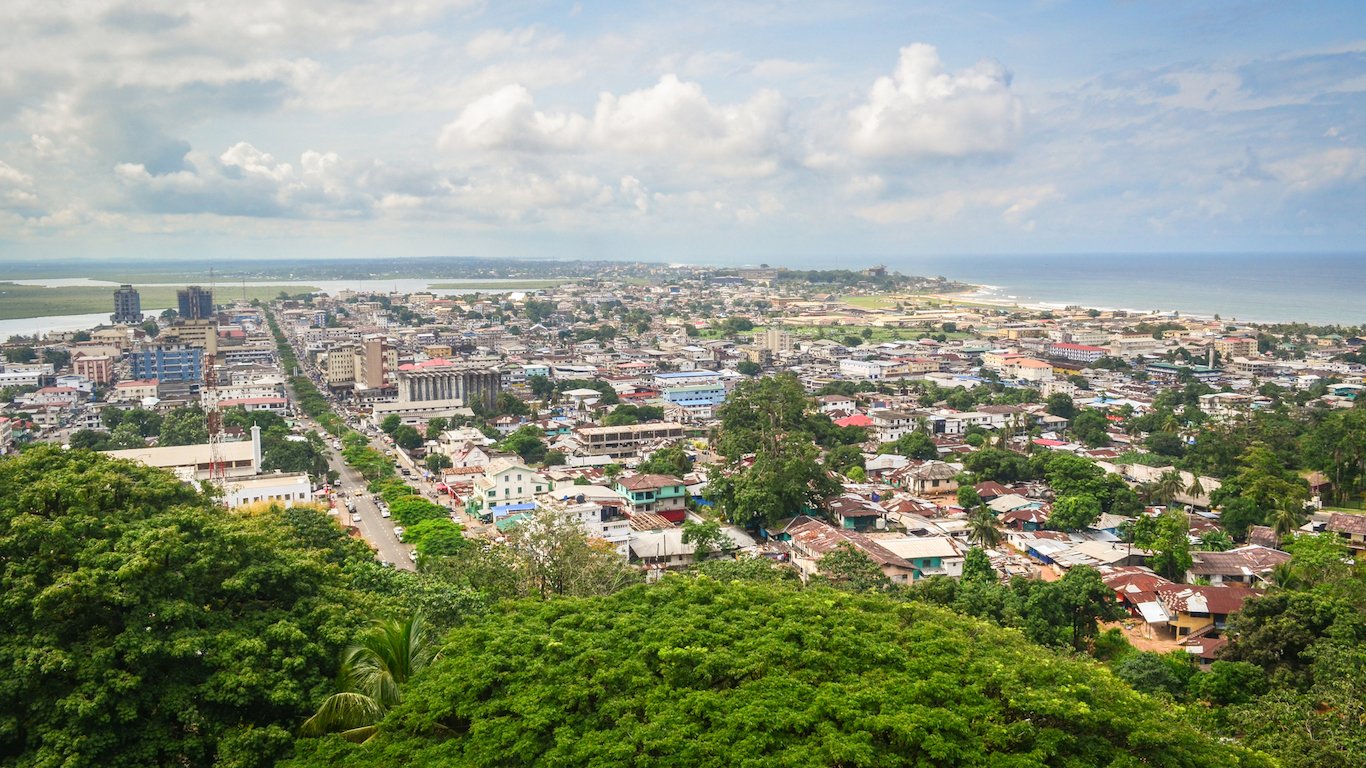
4. Liberia
> GNI per capita: $370
> 2016 GDP: $2.1 billion
> Population: 4.6 million
> Life expectancy: 62.0 years at birth
Liberia, Africa’s oldest republic, is home to more than 4.5 million people. The country, with a government modeled heavily off of the U.S. constitution, is still recovering from a bloody 14-year civil war that ended in 2003.
Liberia had the second largest GDP contraction among the world’s poorest countries at -1.6% in 2016. While still heavily reliant on agriculture, the sector’s GDP contribution decreased from 44.3% in 2011 to 34.2% in 2016. Liberia’s biggest exports are passenger and cargo ships at 45% of total exports.

3. Central African Republic
> GNI per capita: $370
> 2016 GDP: $1.8 billion
> Population: 4.6 million
> Life expectancy: 51.4 years at birth
The average person in Central African Republic lives on less than $400 a year. Like many of the world’s poorest countries, CAR’s economy is primarily labor driven and heavily dependent on farming — with agriculture accounting for about 43% of the country’s GDP.
Limited economic opportunities and low incomes can make it difficult to lead healthy lives, and few parts of the world have a lower life expectancy than CAR. Life expectancy at birth in the landlocked African nation is only 51.4 years, two decades less than the global average.

2. Malawi
> GNI per capita: $320
> 2016 GDP: $5.4 billion
> Population: 18.1 million
> Life expectancy: 62.5 years at birth
Though it has been a democratically stable country since the 1990s, Malawi has considerable hurdles to clear to achieve economic prosperity. Hit especially hard by HIV-AIDS, Malawi is home to over a million children orphaned by the disease. Additionally, the country depends heavily on agriculture — despite an unfavorable arid and dry climate — with crop production accounting for 28.3% of economic output. And while the government spends 20.4% of its budget on education — about 7 percentage points more than the United States — the literacy rate has actually declined 3 percentage points from 2014 to 2015.
[in-text-ad-2]

1. Burundi
> GNI per capita: $280
> 2016 GDP: $3.0 billion
> Population: 10.5 million
> Life expectancy: 57.1 years at birth
Bordered by three other countries on this list, Burundi is a landlocked country in sub-Saharan Africa — and the poorest in the world. Burundi shares several traits common among poor nations. Heavily dependent on labor, some 40% of Burundi’s GDP is derived from agriculture. In comparison, agriculture accounts for only about 1% of economic output in the United States. While many of the poorest countries have rapidly growing economies, economic activity contracted by 0.6% in Burundi in 2016 — even as the global economy expanded by 2.4%.
Economic growth and prosperity are likely stymied by conflict in Burundi. The country has been embroiled in an ethnic civil war for over a decade.
Detailed Findings
The poorest countries in the world tend to be geographically clustered. While there are extremely poor nations in Asia and the Caribbean, the vast majority of countries on this list — 22 out of 25 — are located in sub-Saharan Africa.
Geography is not the only common trait most of the poorest nations share. The majority of countries on this list, particularly those in Africa, are rich in natural resources.
While abundant mineral deposits and rich soil may seem like an economic boon, they actually tend to have the opposite effect. Resource extraction is rarely a path to steady job creation, meaning these countries often suffer from widespread unemployment. Additionally, resource-based economies are often at the mercy of volatile commodity prices. Perhaps most significantly, easy resource revenues appear to lead to corrupt government institutions, conflict, and civil war.
The Democratic Republic of Congo, for example, a country flush with deposits of copper, uranium, gold, diamonds, and other valuable minerals, has been mired in conflict over access to these resources. Civil wars in DRC have claimed the lives of an estimated 6 million people.
Less tangible than lives lost in conflict over resources are the effects of government corruption. According to Transparency International, a corruption watchdog organization, many of the poorest countries in the world also rank among the most corrupt. Corrupt governments are typically characterized by poorly functioning public institutions, bribable public officials, and misappropriated public funds.
All of these factors can stymie economic development — and well over half of the countries on this list rank among the top third most corrupt governments in the world.
Poorer countries often have largely labor-driven economies that are heavily dependent on agriculture. Nearly every country on this list derives at least 20% of its GDP from agriculture. In both Chad and Sierra Leone, farming accounts for over half of all economic activity. In more diversified economies, such as the United States’, agriculture rarely accounts for more than 2% of economic activity.
The impact of economic and political conditions in the world’s poorest countries are often devastating. No country on this list has a life expectancy at birth greater than the global average of 71.9 years — and over half of the poorest countries have average life expectancies below 60 years.
Methodology
To identify the poorest countries in the world, 24/7 Wall St. reviewed GNI data from the World Bank. We ranked the bottom 25 countries based on GNI per capita and supplemented our analysis with GDP and GDP growth rates, as well as poverty and unemployment rates, life expectancy, literacy, Gini coefficients, agricultural economic output, and additional trade data from MIT’s Observatory of Economic Complexity for the most recent year available. Only countries with GNI per capita figures for 2016 were considered. In our analysis, we also included Transparency International’s Corruption Perceptions Index score, which ranks countries based on perceived corruption.
Essential Tips for Investing: Sponsored
A financial advisor can help you understand the advantages and disadvantages of investment properties. Finding a qualified financial advisor doesn’t have to be hard. SmartAsset’s free tool matches you with up to three financial advisors who serve your area, and you can interview your advisor matches at no cost to decide which one is right for you. If you’re ready to find an advisor who can help you achieve your financial goals, get started now.
Investing in real estate can diversify your portfolio. But expanding your horizons may add additional costs. If you’re an investor looking to minimize expenses, consider checking out online brokerages. They often offer low investment fees, helping you maximize your profit.
Thank you for reading! Have some feedback for us?
Contact the 24/7 Wall St. editorial team.
 24/7 Wall St.
24/7 Wall St. 24/7 Wall St.
24/7 Wall St. 24/7 Wall St.
24/7 Wall St.
